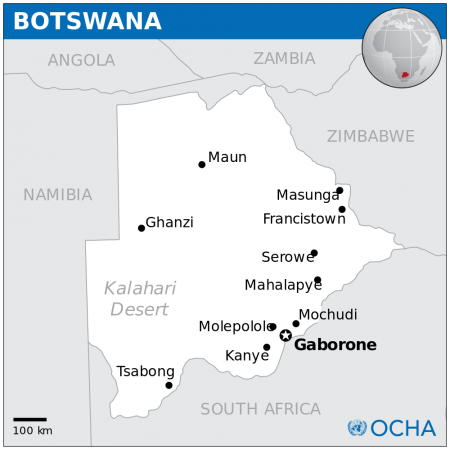Botswana at a Glance
Type: Republic, Parliamentary Democracy
Date of Independence: September 30, 1966
Constitution Signed: March, 1965
Branches:
Executive--President (chief of state and head of government), cabinet
Legislative--popularly elected National Assembly; advisory House of Chiefs
Judicial--High Court, Court of Appeal, local and customary courts, industrial labor court
Suffrage: Universal at 18
Elections: Held every 5 years. Next election will be in October 2028.
Previous Heads of State
Sir Seretse Khama 1966 - 1980
Sir Ketumile Masire 1980 - 1998
Festus G. Mogae 1998 - 2008
Lt. Gen. Dr. Seretse Khama Ian Khama 2008 - 2018
Dr. Mokgweetsi E.K Masisi 2019-2024
Advocate Duma Gideon Boko Present
Political & Economic Stability
Since independence in 1966, Botswana has been a nation-state of good governance, with free and fair elections involving a number of political parties held every five years. There is respect for the rule of law and the Judiciary is independent from influence of the Executive and Legislative branches of Government. The laws of Botswana guarantee, inter alia, individual and group freedoms of expression, association and property ownership.
Botswana’s economic progress since independence is one of the few success stories of the African continent. In 1966 Botswana was one of the 20 poorest countries in the world with a per capita income equivalent to US$80. The country now has a per capita income of approximately US$3,200. There were only 3 secondary schools in 1966. Today there are over 300 secondary schools. All children born in Botswana are guaranteed 10 years of free education. No citizen of Botswana is more than 18 miles from a health care facility.
Thirty six years ago Botswana had only 6 kilometres ( 4 miles) of paved roads. The country now is boasted by a network of modern roads covering an area over 7000 kilometres. Much of Botswana’s economic success is attributed to good and accountable leadership, prudent management of resources, especially revenue earned from diamond exports. Indeed Botswana is one of the few countries where the endowment of such precious natural resources such as diamonds never led to internal rifts over ownership of the mines, the marketing of production from the mines or how to spend the money earned from the gemstones. The Government invested wisely in the education, health, clean water and telecommunications sectors to create a better standard of living for its citizens and more importantly to foster a conducive environment for free enterprise to prosper. The fiscal and monetary policies of the Government of Botswana are designed towards maintaining growth with social justice.
Botswana’s good environment for business has been recognized by international credit rating agencies. Both Moody’s and Standards & Poor have awarded Botswana a sovereign credit rating in the A category. Transparency International continues to recognize Botswana for having the least corrupt system in Africa (you can click www.gov.bw & www.botswana-tourism.gov.bw for more information).
Other Key Facts:
Capital City: Gaborone
Head of State: Advocate Duma Gideon Boko (6th President)
Currency: Pula notes & thebe coins
National Slogan: Pula (meaning rain)
Population: 2.34 million (2022 est)
Population Growth Rate: 2.4 % per annum (2002 est)
Main Exports: Diamonds, textiles, beef, soda ash
Trading Partners: Southern Africa, European Union and the United States
GNP: P32.0 billion (2002 est)
Land Size: 582,000 sq. km
Electricity: 230volt A/C 50 hz

